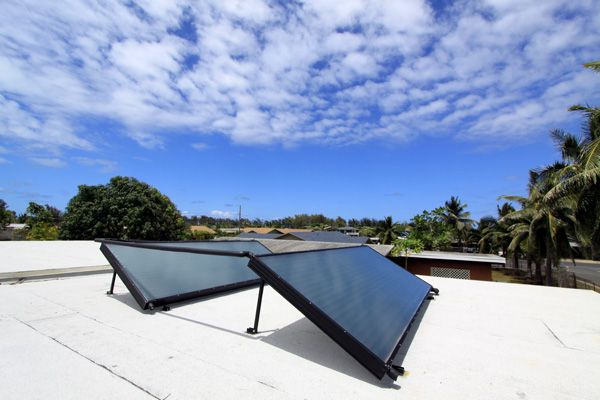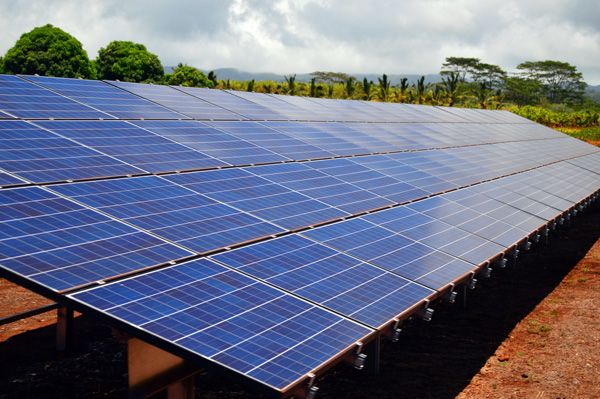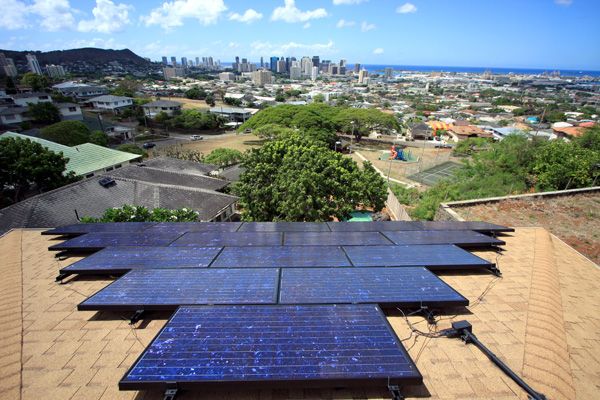Do solar panels make the house hotter?
Solar panels can make a house hotter, but this is generally not the case when installed properly. While solar panels absorb energy from the sun and could theoretically lead to increased temperatures on certain areas of the roof, in reality these effects are usually minimal. The added insulation and shading properties of solar panels usually result in a cooler home overall.
Solar panels are composed of photovoltaic material that absorbs heat from the sun and converts it into electricity. When installed correctly, solar panels are designed to be several inches away from the rooftop and create a small gap that allows for air circulation underneath them. This extra insulation helps protect against radiant heat from entering the attic space below, leading to cooler temperatures compared to without them. In addition, modern solar technology has also evolved with integrated cooling systems built into some modules which further reduce any accumulated thermal energy and help mitigate hot spots beneath them.
Do Solar Panels Make the House Hotter?
It’s important to note that for those living in extremely warm climates where high summer temperatures are common, solar panel shading may not always be enough to cool down a home significantly–in these cases chiller units or additional ventilation systems may be necessary for more significant temperature drops.
Additionally, while it is possible for solar panels themselves to reach very high temperatures during peak hours of sunlight–upwards of 200 degrees Fahrenheit–they are designed with safety features like disconnect switches that will shut off power if certain levels of heat are exceeded; these features ensure your system remains safe even if temperatures get too hot.
Do Solar Panels Increase House Temperature?
Overall, while installing solar panels may cause minimal increases in roof temperature on specific sections due to their absorptive properties, they offer greater benefits such as increased energy efficiency and lower electricity bills which far outweigh any potential drawbacks like minor warmth increases in homes. With proper installation techniques and knowledge about how these PV modules work, you can experience both cost savings as well as cooler indoor climate control for your home!
Do Solar Panels Have A Cooling Effect?
For homeowners looking to install solar panels, it is important to consider the roof structure and ventilation of the home as well as the angle of the panels. Proper installation can help ensure that solar panels will not increase the temperature of a house. Furthermore, in some cases solar panels may even offer additional protective measures from extreme heat by providing an extra layer of insulation and shading. As long as these factors are taken into consideration, solar panel installations can be a great way to reduce electricity bills and take advantage of the various tax credits available in The Aloha State!
How Much Heat Energy Does A Solar Panel Spread Across A House
Solar panels absorb energy from the sun and convert it into electricity, but they don’t actually spread heat energy across a house. While the solar panels themselves can reach very high temperatures during peak hours of sunlight–upwards of 200 degrees Fahrenheit–they are designed with safety features that will shut off power if certain levels of heat are exceeded. This ensures that your home remains safe even if temperatures get too hot.
That said, if solar panels are installed at a steep angle, they could theoretically increase the temperature of the roof, though this is usually not the case when done properly. Even in sunny climates where high summer temperatures are common, modern solar panel technology is designed to offer increased insulation and shading properties which reduce any added thermal energy and help mitigate hot spots beneath them. All in all, solar panel installations can be a great way to cut down on electricity bills while keeping cool temperatures inside your home!
The Effect Of Solar Panels On House Temperature
The idea that solar panels make a house hotter is a common misconception. Although the panels absorb solar energy and can reach high temperatures during peak hours of sunlight, modern solar panel technology has been designed to provide extra insulation and shading that can reduce any added thermal energy and help mitigate hot spots beneath them.
Homeowners looking to install solar panels should consider the roof structure and ventilation of their home as well as the angle of the panels to ensure that they will not contribute to an increase in temperature levels inside the house. In sunny climates where high summer temperatures are common, properly installed solar panel systems could even offer additional protection from extreme heat while still providing a cost savings on electricity bills.
Ultimately, installing solar panels can be a great way to take advantage of the various tax credits available in The Aloha State without having to worry about added heat energy inside your home. With careful planning, you can power your home with clean energy while still remaining cool and comfortable!
Do Solar Panels Dissipate Heat?
Solar panels are a great way to take advantage of renewable energy sources and save money on electric bills. But do solar panels actually dissipate heat? The answer is that it depends on the type of panel installed, the positioning of the panel, and the external environment.
Solar photovoltaic (solar PV) cells absorb radiant energy from the sun and convert it into electricity. As these cells do their job, they can reach very high temperatures in peak hours of sunlight — sometimes over 200 degrees Fahrenheit. While modern solar panel technology has safety features built in to shut off power if certain levels of heat are exceeded, this still raises an important question: Do solar panels dissipate heat?
The answer is yes — but how much they dissipate drastically depends on how they are positioned and what type of system you have installed. If your panels sit at a steep angle against your roof, then chances are they may be adding extra thermal energy to any hot spots on your roof. On the other hand, if your home’s ventilation system is up to date and your slow-angle panels are tucked away from direct sunlight, then you shouldn’t see any additional increase in temperature caused by the solar energy conversion process.
Ultimately, installing proper insulation for both your home and your solar array can help keep unwanted heat outside so you can enjoy clean energy without added thermal stress!
Do Solar Panels Increase House Temperature?
The notion that solar panels make a house hotter is one that many homeowners consider when exploring renewable energy sources. With mounting concerns over global warming, homeowners are looking for ways to reduce their carbon footprints while also cutting down on pricey electricity bills.
But do solar panels actually increase the temperature inside a home? To answer this question, you have to look at the various factors involving the type of solar panel system installed and the roof structure of your home.
When it comes to modern solar technology, most systems are designed to be efficient with minimal gain in thermal energy. However, in warmer climates where high summer temperatures are common, extra insulation and shading should be used to ensure that any additional heat created by the sun’s rays will not be absorbed into your home’s interior space.
The best way to prepare for a decrease in temperature is by creating a well-ventilated roofing system and positioning the solar panels at an angle of less than 45 degrees so that direct sunlight exposure is limited. This allows excess heat to quickly dissipate from the roof surface rather than being absorbed into your home’s interior space.
In short, properly installed solar panel systems can generate clean energy without raising interior temperatures inside your home – making them an excellent choice for anybody looking to save money on electric bills!












